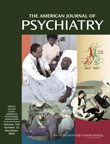Generalized Cognitive Impairments, Ability to Perform Everyday Tasks, and Level of Independence in Community Living Situations of Older Patients With Psychosis
Abstract
OBJECTIVE: This study examined the relationship between performance of instrumental activities of daily living, as measured with the University of California, San Diego, Performance-Based Skills Assessment (UPSA), and measures of cognitive functioning and independence in the community living situation of older outpatients with psychotic disorders. METHOD: One hundred eleven middle-aged and elderly outpatients with primary psychotic disorders were administered the UPSA, the Mattis Dementia Rating Scale, and standardized measures of psychopathology. Independence in the community living situation was rated on a scale from 1 to 5, with 5 representing the highest level of independence, such as living alone in an apartment or house. Ability in seven domains of neuropsychological functioning was assessed in 67 participants. RESULTS: Total scores on the University of California, San Diego, Performance-Based Skills Assessment were significantly correlated with total and subscale scores on the Mattis Dementia Rating Scale, level of independence in the community living situation, and scores on the neuropsychological measures in the subset of patients who underwent neuropsychological testing. Lower scores on the Mattis Dementia Rating Scale memory subscale and more severe negative symptoms were significantly associated with worse performance on the skills assessment. Performance on the skills assessment contributed uniquely to prediction of independence in the community living situation. CONCLUSIONS: Generalized cognitive abilities are associated with everyday functioning capacity in older patients with psychosis. Reduction of cognitive deficits and negative symptoms may improve patients’ ability to function independently in the community.



